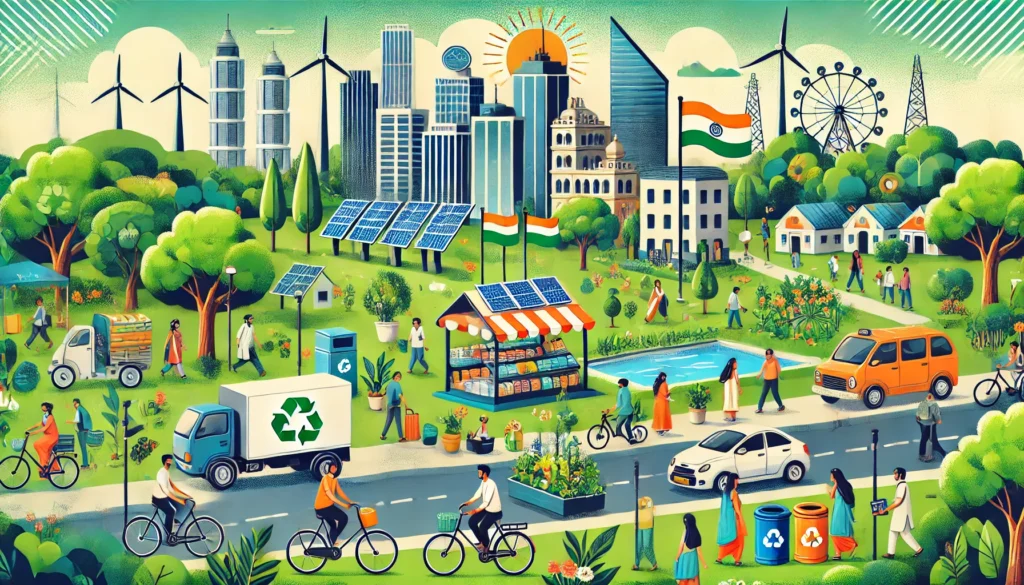The Ultimate Guide to Eco-Friendly Living and Sustainable Practices in India

In recent years, India has seen an incredible shift toward sustainable living. As climate change becomes an urgent global issue, many Indian cities, communities, and households are adopting eco-friendly practices that not only protect the environment but also enhance well-being. This guide will take you through various sustainable practices in India, from energy efficiency to waste management, and how you can incorporate them into your daily life.

1. Solar Energy: Harnessing the Power of the Sun
India, with its abundance of sunlight, is an ideal place for solar energy adoption. Across cities and rural areas, solar panels are becoming a common sight on rooftops. Whether for home use or large-scale commercial applications, solar energy offers a clean and renewable alternative to traditional power sources.
Why Go Solar?
- Cost Savings: After the initial setup, solar panels reduce electricity bills significantly, making it a wise long-term investment.
- Environmentally Friendly: Solar energy reduces your carbon footprint by decreasing reliance on fossil fuels.
- Government Support: The Indian government provides subsidies and tax incentives for installing solar panels, making it more accessible to households and businesses.
How to Start?
To start using solar energy, research local providers and understand the financial benefits. Many cities offer incentives, and the return on investment usually happens within a few years, after which you’re saving energy costs indefinitely.

2. Rainwater Harvesting: Conserving Water the Smart Way
India’s water scarcity issue can be mitigated by adopting rainwater harvesting systems. Rainwater harvesting involves collecting and storing rainwater for future use, reducing dependency on groundwater. It’s a simple and highly effective way to conserve this precious resource.
Benefits of Rainwater Harvesting
- Water Conservation: Capturing rainwater reduces strain on public water supply systems.
- Cost-Efficiency: Rainwater can be used for various household purposes like gardening, washing, and even drinking after filtration.
- Easy to Implement: Many Indian homes can easily set up rainwater harvesting systems using gutters, downpipes, and storage tanks.
How to Set It Up?
Start by checking your roof and surroundings. Install gutters and pipes to direct the rainwater into a storage tank or cistern. For filtration and purification, you can add a filter system to make the water usable for daily chores or even drinking.

3. Organic Farming and Urban Gardens
Whether you live in a bustling city or a quiet village, organic farming and urban gardening are highly beneficial ways to contribute to sustainable living. In cities like Mumbai and Bangalore, rooftop gardens are becoming increasingly popular. People grow their own vegetables, herbs, and fruits in small spaces, promoting healthy eating and reducing dependency on mass-produced food.
Why Grow Your Own Food?
- Healthier Diet: Organic gardening ensures you are consuming fresh, pesticide-free produce.
- Environmental Impact: Growing food locally reduces the carbon footprint associated with transportation.
- Educational and Fun: Gardening is a great way to connect with nature, and it can be a fun activity for families and children.
How to Start?
You don’t need a huge backyard to start gardening. Even apartment dwellers can create small balcony or rooftop gardens. Invest in organic seeds, natural compost, and local plants that thrive in your climate.
4. Waste Management: The Key to a Cleaner India
Waste management is one of India’s biggest environmental challenges, but the solution starts at home. Separating waste into recyclable and non-recyclable categories, composting organic waste, and reducing plastic usage are crucial steps toward a sustainable lifestyle.
Tips for Effective Waste Management
- Segregate Waste: Separate your household waste into categories such as organic, recyclable, and non-recyclable.
- Composting: Turn your kitchen waste into compost for your garden. It reduces the amount of waste sent to landfills and improves soil quality.
- Reduce Plastic Usage: Opt for reusable bags, bottles, and containers instead of plastic ones. Many cities are now banning single-use plastics, making it easier to make this switch.
5. Sustainable Transportation: Going Green on the Move
India’s cities are bustling, but that doesn’t mean you can’t go green while traveling. Electric vehicles (EVs), bicycles, and public transport are becoming increasingly popular, helping reduce pollution and conserve energy.
Why Choose Eco-Friendly Transport?
- Health Benefits: Cycling or walking not only reduces pollution but also improves physical health.
- Cost Efficiency: EVs and public transportation are often cheaper than owning and maintaining a car.
- Government Initiatives: The Indian government is heavily promoting the use of electric vehicles, providing subsidies and building more EV charging stations.
How to Make the Switch?
If you’re in the market for a new vehicle, consider going electric. For shorter trips, choose to walk, cycle, or take public transportation. Many cities are enhancing their bike lanes and public transport systems to make eco-friendly travel more convenient.
Conclusion
Eco-friendly living and sustainable practices are not only good for the environment but also for your wallet and health. By adopting solar energy, rainwater harvesting, organic farming, and proper waste management, you can make a significant difference in India’s journey toward a greener future. Whether you live in a rural or urban area, these steps are easy to implement and will have a lasting positive impact on our planet.



